Canada should brace for a potentially bruising political showdown with the United States this summer as Washington considers sending its navy through the Northwest Passage, undermining Canada’s sovereignty claim over the Arctic sea route in a message intended as a warning to Russia, experts say.
Navy Secretary Richard Spencer told reporters last week Washington is exploring the possibility of sending a ship through the Northwest Passage this summer as part of a freedom of navigation operation (FONOP) to assert its right of passage through what it considers to be international waters.
Spencer’s message was reinforced Monday by Secretary of State Mike Pompeo who told a meeting of foreign ministers of the Arctic Council in northern Finland, that the U.S. doesn’t recognize Canada’s “illegitimate” claim to the Northwest Passage, which cuts through the Canadian Arctic Archipelago, or Russia’s sovereignty over the Northern Sea Route along its Arctic coastline.
Both Canada and Russia claim these passages are internal waters and argue that the U.N. Convention on the Law of the Sea (UNCLOS) allows coastal states to manage ice-covered waters.
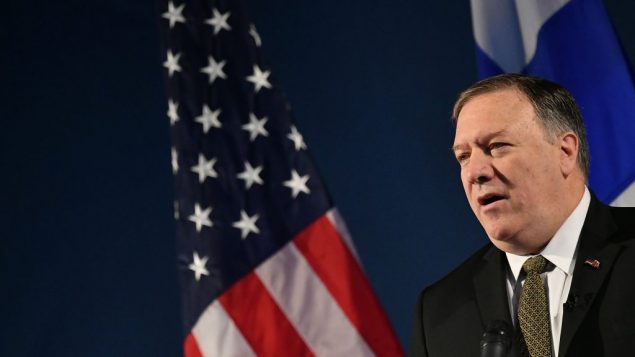
U.S. Secretary of State Mike Pompeo speaks on Arctic policy at the Lappi Areena in Rovaniemi, Finland, Monday May 6, 2019. Pompeo is in Rovaniemi to attend the Arctic Council Ministerial Meeting. (Mandel Ngan/Pool via AP)
Pompeo’s remarks during a blustery speech where he attacked both Russia’s but also China’s Arctic ambitions, come after a series of pronouncements by U.S. officials in recent months, where they floated the idea of conducting freedom of navigation operations in Arctic waters, just as Washington begins to see the region as “an arena for power and for competition” in Pompeo’s words.
With receding sea ice, the Arctic Ocean is rapidly taking on new strategic significance for the U.S., Pompeo told an audience of stunned Arctic Council foreign ministers and Indigenous leaders during a speech in Rovaniemi, Finland.
Offshore resources in the rapidly melting Arctic are the subject of renewed competition, he added.
“Steady reductions in sea ice are opening new passageways and new opportunities for trade,” Pompeo said. “This could potentially slash the time it takes to travel between Asia and the West by as much as 20 days. Arctic sea lanes could come before – could come the 21s century Suez and Panama Canals.”
‘Mind-bogglingly provocative’
But while the warming Arctic may open dramatic new possibilities for shipping and commerce, plans for U.S. Navy Arctic operations are premature and potentially dangerous, said Becca Pincus, an assistant professor in the Strategic and Operational Research Department at the U.S. Naval War College.
“In Russia it would be just mind-bogglingly provocative,” Pincus told Radio Canada International. “It is really hard for me to think of a more provocative action the U.S. could take vis-à-vis Russia among the suit of legal steps.”
Russia is not going just watch the U.S. ships go by and issue a diplomatic protest, she said.
“It’s going to be a crisis,” Pincus said. “And we’re already at a boiling point, it’s really risky.”
And on the Canadian side it would also provoke an enormous political backlash, she said.
“I don’t think there would be as much potential for sort of a kinetic level crisis as you’d see on the Russian side,” Pincus said. “I think it would be a political crisis rather than, perhaps, a military crisis.”
However, it’s hard to understand how applying pressure on Canada – one of the closest U.S. allies, a partner in NORAD – would benefit Washington and how it would outweigh the enormous political cost that would ensue, she added.
Business as usual
Officials with Global Affairs Canada reiterated Monday Ottawa’s commitment “to exercising the full extent of its rights and sovereignty over its territory and its Arctic waters, including the various waterways commonly referred to as the Northwest Passage.”
The waterways that make up the Northwest Passage are part of the internal waters of Canada, said a statement from Global Affairs Canada.
“Canada and the U.S. have differing views regarding the status of the Northwest Passage under international law,” the statement said.
“The situation is well managed, including through the 1988 Arctic Cooperation Agreement, according to which the U.S. government seeks Canada’s consent for its ice breakers to navigate the waterways.”
And when it comes to defence and security, relations between Canada and the U.S. are “longstanding, well-entrenched and highly successful,” the statement added.
Lack of ice-strengthened ships could hamper U.S. Arctic ambitions
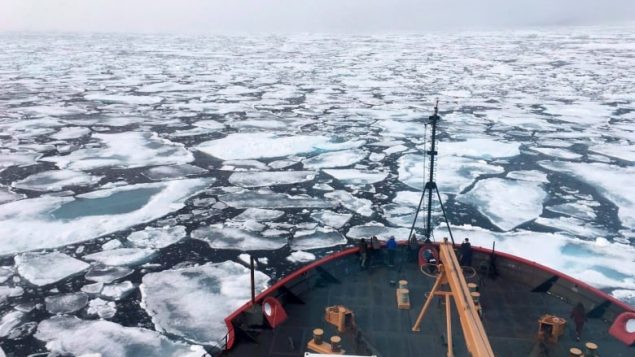
This summer 2018 photo shows the USCG Icebreaker Healy on a research cruise in the Chukchi Sea of the Arctic Ocean. (Devin Powell/NOAA/The Associated Press)
It’s also not clear what vessels the U.S. plans to use to conduct the FONOP this time around, Pincus said.
“You would need an ice-strengthened vessel of some kind to do a FONOP in the Arctic region whether you’re going through the Northwest Passage or Northern Sea Route (NSR),” Pincus said. “The United States Navy doesn’t have ice-strengthened surface vessels, period.”
And the U.S. Coast Guard has one functioning medium class icebreaker, USCGS Healy, that is fully booked for science missions this summer, she added.
“I have no idea how the Navy would execute a FONOP through either the NSR or the Northwest Passage without an icebreaker and I don’t know where they would get an icebreaker,” Pincus said. “It does not seem to me feasible.”
Doing a freedom of navigation operation without an icebreaker escort would be extremely dangerous, she added.
“It would be a hell of a risk to take particularly when you’re conducting an operation that is designed to challenge the coastal state,” Pincus said. “You’re not going to be in a position to get a lot of help from that coastal state.”
And if the U.S. vessel were to run into trouble in the Northwest Passage and forced to ask for help from Canadian authorities, it would undermine the point of the mission, she said.
“I think this proposal reflects a lack of familiarity with the specifics and the particulars of the Arctic region,” Pincus said.
Concern over Russia and China
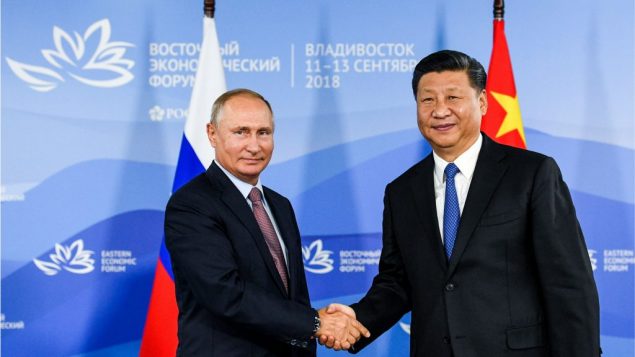
Russian President Vladimir Putin shakes hands with Chinese President Xi Jinping during a meeting with participants of a round table discussion on Russia-China Cooperation on the sidelines of the Eastern Economic Forum in Vladivostok, Russia September 11, 2018. (Donat Sorokin/Tass Host Photo Agency/Pool via Reuters)
The Trump administration’s newfound zeal for the Arctic region is likely driven by renewed tensions with Russia and, particularly, China, Pincus said.
The U.S. military is trying to use the same toolkit it uses to assert its freedom of navigation around the world and applying it to a new region, she said.
“I think senior people in security circles are looking at Russia, they are increasingly looking at the High North of the Arctic region and they look at their standard toolkit and they say, ‘We use FONOPs to challenge China in the South China Sea, Russia has these claims we don’t agree with. Let’s take this tool out of our standard portfolio and apply it in this region,’” Pincus said.
Pressure on Ottawa
Rob Huebert, senior research fellow with the Centre for Military and Strategic Studies at the University of Calgary, said remarks by senior administration officials are puzzling and disconcerting.
“Is this something to suggest that the special relationship that has allowed us to have an agreement to disagree but neither side pushing on the issue, has that come to an end like so many other things within the Trump administration?” Huebert said. “Or is he signalling to the Russians and the Chinese.
“I mean it may be easier to threaten us than it is to [threaten] them but it still gets the message across to the Russians that they cannot take it for granted the Americans will not challenge them.”
The message is that if the Americans are willing to challenge their best friend, Canada, they will obviously challenge Russia’s claim to sovereignty over the Northern Sea Route too, Huebert said.
Twice during the height of the Cold War in 1965 and 1967, the U.S. attempted to challenge then Soviet claims of sovereignty over the so-called Northeast Passage, which connects the Pacific and Atlantic Oceans along the entire length of Russia’s European and Asian Arctic coastlines.
However, the Soviets successfully forced the U.S. icebreakers to turn back and Washington hasn’t attempted a freedom of navigation operation in the Russian Arctic since then.
Limited options for Canada
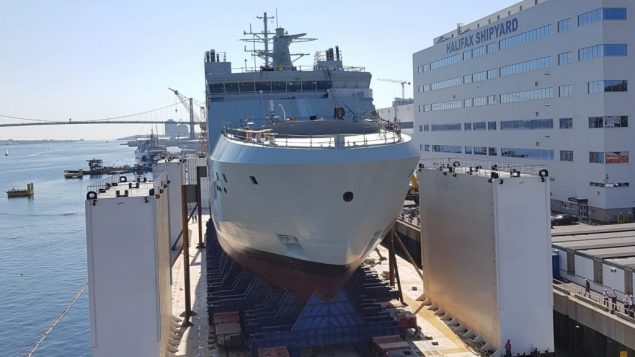
Future HMCS Harry DeWolf Arctic and Offshore Patrol Ship sits on a submersible barge at Halifax Shipyard for the planned launch on Saturday, Sept. 15, 2018. (Irving Shipbuilding)
If the U.S. decides to go ahead with a freedom of navigation operation in the Northwest Passage, Canada’s options are pretty limited, Huebert said.
“We’re not going to physically stop them,” Huebert said.
Canada could send one of its Coast Guard vessels to escort U.S. ships and issue a diplomatic protest as it did in 1985, the last time the U.S. sent a ship through the Northwest Passage without Ottawa’s consent.
If the U.S. operation is delayed until next year, the Royal Canadian Navy could dispatch one of its brand new Harry deWolf-class Arctic and Offshore Patrol Ships (AOPS) to escort the U.S. vessels.
“Unfortunately, timing becomes everything,” Huebert said. “Next year, we could use as Harry deWolf as a means of illustrating that we don’t approve of this but we’re not going to take it to the extremes of what the Soviets did in 1967.”
At the time, Moscow warned Washington that if U.S. Coast Guard vessels try to go through the Northeast Passage without permission the Soviet navy would open fire on American ships, Huebert said.
What is clear is the U.S. is beginning to prepare for eventual Arctic naval operations.
Last year, it sent its Harry S. Truman Carrier Strike Group above the Arctic Circle to take part in NATO’s Trident Juncture 2018 exercise, the first time a U.S. aircraft carrier had sailed into Arctic waters since the end of the Cold War, Huebert said.
“This is all part of regaining that capability of going to the High North,” Huebert said.
Focus on safety

The Coast Guard icebreaker Terry Fox sits in the waters of Lancaster Sound, Nunavut at the eastern gates of the Northwest Passage in August 2006. (Bob Weber/THE CANADIAN PRESS)
Michael Byers, Canada Research Chair in Global Politics and International Law at the University of British Columbia, said Canada should focus on trying to convince the Americans that doing a freedom of navigation operation in the Arctic is simply not safe.
Foreign Affairs Minister Chrystia Freeland who is attending the ministerial in Rovaniemi should pull her American counterpart aside to try to explain to him that taking a non-ice strengthened vessel to the Arctic is a recipe for disaster, Byers said.
“Although the ice is receding, it is becoming less predictable, less ice means it’s more mobile, which means it can flow around much more and end up in unexpected places,” Byers said. “There is also more glacial ice, more icebergs and bergy bits because the glaciers are moving more quickly into the ocean as a result of climate change.”
And then you have hazards like icing where during an Arctic storm spray from the waves can freeze on the superstructure of the vessel and cause it to become unstable, Byers said.
“And this can happen in the Arctic in the summer time because you can have freezing air temperatures and open water,” Byers said. “It’s a very dangerous place and there is very good chance that any such mission would have to be rescued by either Russian or Canadian authorities, which is not something that any U.S. leader would wish.”
While Pompeo’s remarks on the Northwest Passage reflect nearly five decades of U.S. policy, his speech contained a number of worrying factual mistakes, Byers said.
The top U.S. diplomat not only mixed up the date his country purchased Alaska from Russia (it was 1867, not 1857) but he also mistakenly claimed that China is trying to build infrastructure in the Canadian Far North.
China is “planning to build infrastructure from Canada, to the Northwest Territories, to Siberia,” Pompeo said. “This is part of a very familiar pattern. Beijing attempts to develop critical infrastructure using Chinese money, Chinese companies, and Chinese workers — in some cases, to establish a permanent Chinese security presence.”
There are no Chinese infrastructure investments in the Canadian Arctic except for a Chinese-owned mine in northern Quebec and the Northwest Territories are part of Canada, Byers said.
Instead of fretting over whether Washington’s plans to conduct a freedom of navigation operation in Canadian waters, Ottawa should be more worried that Pompeo’s signature Arctic policy speech appears to have been written by an intern with scant knowledge of the region, Byers said.
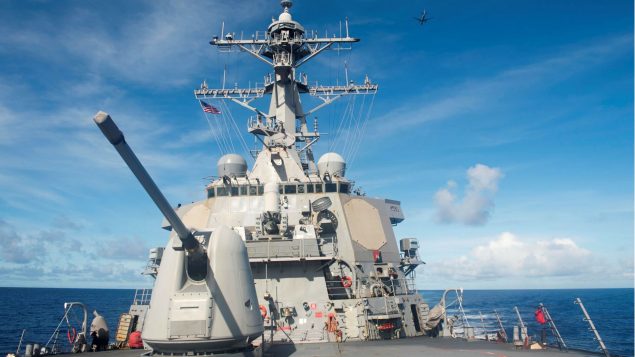






For reasons beyond our control, and for an undetermined period of time, our comment section is now closed. However, our social networks remain open to your contributions.